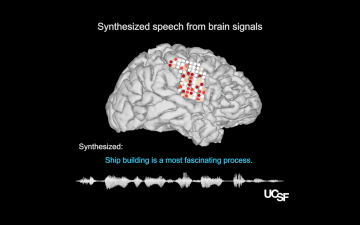Karen Weintraub in Scientific American:
 Stroke, amyotrophic lateral sclerosis and other medical conditions can rob people of their ability to speak. Their communication is limited to the speed at which they can move a cursor with their eyes (just eight to 10 words per minute), in contrast with the natural spoken pace of 120 to 150 words per minute. Now, although still a long way from restoring natural speech, researchers at the University of California, San Francisco, have generated intelligible sentences from the thoughts of people without speech difficulties.
Stroke, amyotrophic lateral sclerosis and other medical conditions can rob people of their ability to speak. Their communication is limited to the speed at which they can move a cursor with their eyes (just eight to 10 words per minute), in contrast with the natural spoken pace of 120 to 150 words per minute. Now, although still a long way from restoring natural speech, researchers at the University of California, San Francisco, have generated intelligible sentences from the thoughts of people without speech difficulties.
The work provides a proof of principle that it should one day be possible to turn imagined words into understandable, real-time speech circumventing the vocal machinery, Edward Chang, a neurosurgeon at U.C.S.F. and co-author of the study published Wednesday in Nature, said Tuesday in a news conference. “Very few of us have any real idea of what’s going on in our mouth when we speak,” he said. “The brain translates those thoughts of what you want to say into movements of the vocal tract, and that’s what we want to decode.”
But Chang cautions that the technology, which has only been tested on people with typical speech, might be much harder to make work in those who cannot speak—and particularly in people who have never been able to speak because of a movement disorder such as cerebral palsy.
More here.
